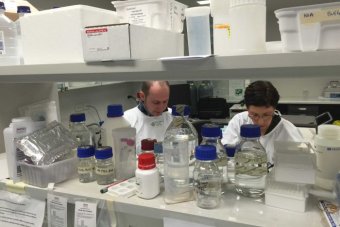Scientists suspect it could be home to thousands of species of bacteria and it is one of the hottest topics in health and wellbeing today – the gut.
Society is embracing gut health, taking up new diets and even trying extreme treatments like faecal transplants.
There is a reason why people are so interested, according to Professor Steve Simpson from Sydney University’s Charles Perkins Centre.
“I think fundamentally it all comes down to the fact that we’re fascinated with poo from childhood and we worry about our bowels and the way that our gut feels,” he said.
“It really is something that is constantly on people’s minds you have a real appreciation of what’s going on in your gut.”
How does pooing work?

Microbiologist and author Giulia Enders explains why we poo and why going to the loo is a demonstration of how amazing the human body is.
It is thought the colonies of bacteria in the gut, called the microbiome, could play a role in major conditions or diseases in other parts of the body and central nervous system like autism, Parkinson’s disease, cancer and multiple sclerosis.
But Professor Simpson said some gut-related treatments or products are claiming to be able treat conditions for which there is no medical basis.
“That’s a field that’s burgeoned over the last 10 years,” he said.
“It’s really taken off to a point which is almost alarming.
“You can read now that bacteria in the gut is responsible for almost everything imaginable about your health.”
Dangerous online DIY information for faecal transplants
One of the most in vogue but unregulated gut treatments is faecal transplantation, in which a healthy donor’s faeces is taken, treated and then transplanted into a person’s bowels via tube or enema to repopulate the gut with that healthy bacteria.
There are warnings that such treatments could be on the same scale as organ transplants.
Private practitioners are offering faecal transplantation in Australia at a cost of $10,000, to treat serious inflammatory gut conditions and other disorders.
There is also dangerous DIY information online.
What your poo can tell you

You probably avoid thinking about what happens to food as it passes through your body, but it may have an important message for you.
Melbourne-based gastroenterologist Dr Andrew Brett said the promise that faecal transplants could treat more serious auto-immune or neurological conditions has not been proven beyond doubt.
“Faecal transplantation has proven to be fantastic for resistant bacterial infection, but people are now using this treatment for all sorts of other medical conditions, some related to the bowel and some not related to the bowel,” he said.
“To be honest the evidence for a lot of these treatments isn’t there.”
Dr Brett said while the science was exciting, the treatment should be approached with caution.
“There’s still a long way to go and the understanding is very poor,” he said.
“There there’s certainly people offering these treatments which really in a non-evidence based situation could be potentially dangerous.
“In fact the FDA in America recently considered that a faecal transplant was of a similar magnitude to organ transplantation and there’s been a lot of legal discussion in America about what risks and what steps need to be taken and that’s still ongoing and hasn’t been fully decided.
“The regulatory authorities in Australia have basically avoided the discussion altogether.”
Dr Brett said research on the relationship between gut bacteria and wellbeing was still in its early days.
“The more we understand about gut bacteria, the more we realise the less we know,” he said.
“There’s certainly a very complex interplay between the combination of bacteria in the bowel, the immune system and the metabolism.
“So changing people’s bacteria can alter their metabolism and it certainly has a large effect on the immune system and also the defence of the body against infection.”
Look at diet before taking extreme measures, nutritionist warns
Dr Jane Muir is a nutritionist at Monash University’s Gastroenterology Department and an acknowledged world leader in research into nutrition and the gut.
Dr Muir said before taking extreme measures, people should look to their diet.
“We just are at the very start of a very new area of research I think and it’s very exciting,” she said.
She recommends foods that contain fibre, as well as prebiotic carbohydrates like breads high in rye, barley, onions, garlic and legumes.
But Dr Muir said it was still a confusing area of science.
“Although they know it’s very important I think there’s a lot of good and bad information out there and people can search on Dr Google and find both good and bad information,” she said.
One thing we should remember about our gut bacteria according to Professor Simpson is it is better in than out.
“You only have to go back 20 years when the fashion was to flush out all those ‘unpleasant bacteria’ that were living in the gut,” he said.
“We now know that that’s probably a disastrous thing to do health-wise because those bacteria are supporting our health.”
Watch Hamish Fitzsimmon’s full report, plus an interview with best selling author Giulia Enders on Lateline tonight at 9:30pm (AEST) on ABC News 24 or 10:30pm on ABC TV.

